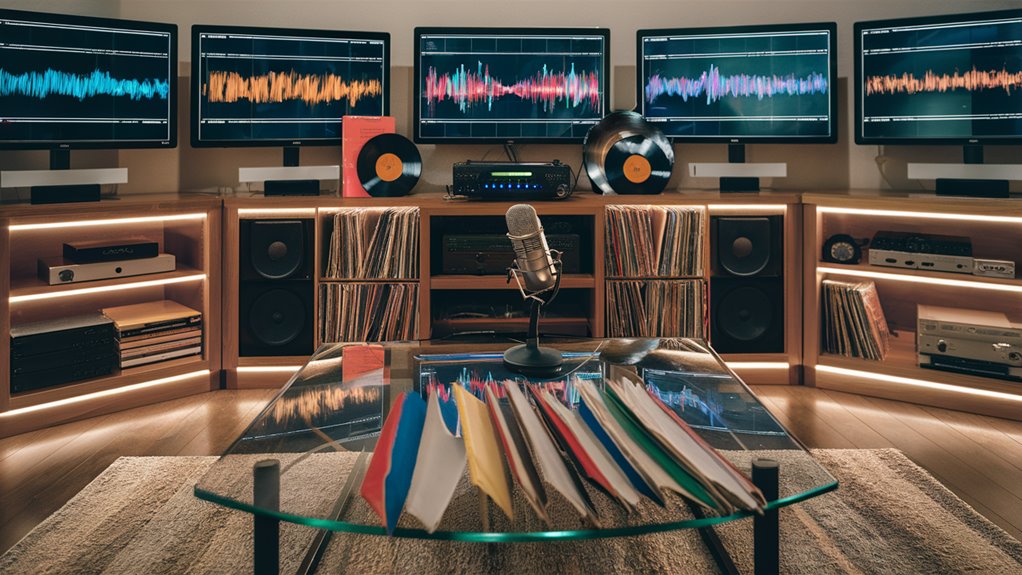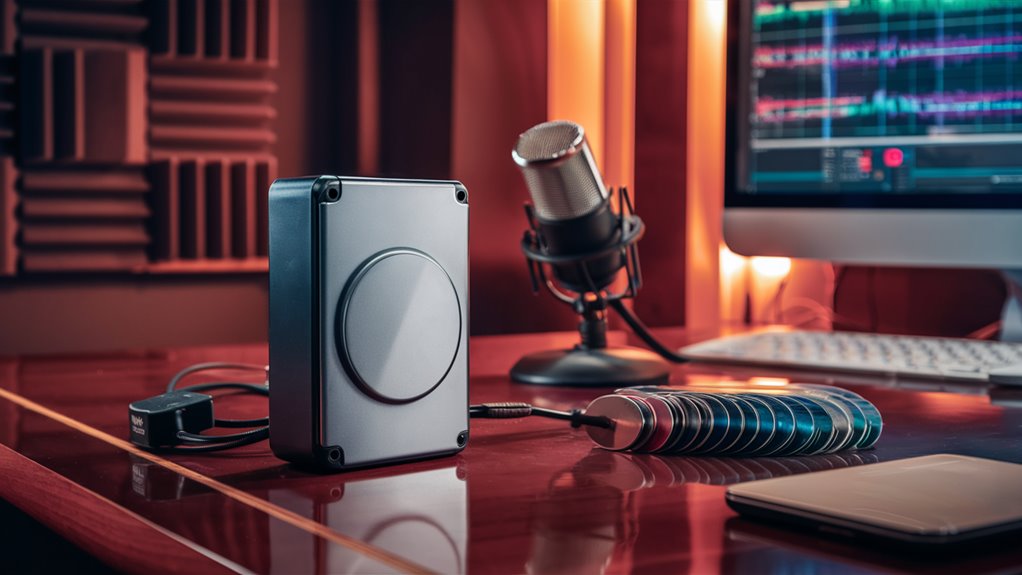Best Ways to Set Up Your Karaoke Music List

Key Steps to Sort Your Files
Make a top-notch karaoke setup by using a simple file name rule: “Artist – Song (Year)“. Sort songs into folders based on type with special spots for MP3+G, CDG, and video types.
Tagging and Info Handling
Make it easy to find songs by tagging files with key info bits:
- Song name and singer
- Music type
- Languages
- Music key
- BPM (Beats Per Minute)
- Length
Solutions for Managing Databases
Small Groups (Under 1,000 Songs)
Microsoft Excel is good enough for:
- List of songs
- Easy sorting
- Making playlists
- Fast searches
Big Collections
Use strong database handling tools:
- MySQL for full lists
- MediaMonkey for better song order
- Custom SQL setups for big needs
Keeping and Backing Up Data
Main Storage
- Keep played lists on SSDs for best speed
- Keep folder setup for quick use
- Use local network storage for setups with many systems
Backup Options
- External hard drives for backups not on your system
- Cloud storage for use away from home
- Planned backup setups for keeping data safe
Making Things Run Smooth
- Mark songs played a lot
- Save used lists
- Use search tools
- Take care of your database often
How to Name Your Files Right
How to Name Your Music Files Right
Stick to One Way to Name Files
Start sorting your music by using a clear file naming plan.
The best setup is: “Artist Name – Song Title (Year)” and keep the style the same. For instance: “Journey – Don’t Stop Believin’ (1981)“.
Handling Different Versions
If you have several types of the same song, add clear marks:
- “_(Instrumental)”
- “_(Duet)”
- “_(Original Key)”
For songs by others too, show the first singer: “Metallica – Whiskey in the Jar (1998) (Thin Lizzy Cover)“.
More Ways to Order Files
File Order
Get better order through:
- Subfolders by music type
- By decade
- By language
Tips on Naming
- Use dashes to split names and titles
- Use brackets for extra info
- Take out symbols like /, ?, *
- For two singers: “David Bowie & Queen – Under Pressure (1981)”
This clear way to name files helps you find your music fast and keeps your setup tidy over time.
Must-Have Info Tags
Key Info Tags for Karaoke Files
Main Info Bits
Tagging lays the base for a smooth digital music setup, mainly for karaoke lists.
These needed tags make sure everything is easy to find:
- Name
- Artist
- Year
- Language
- Type
- Length
- Mark if it’s a karaoke type
Extra Karaoke-Specific Tags
Pro karaoke setups need more special info spots:
- Note for music key
- BPM (beats per minute)
- Titles in more than one language
- Tags for file types (MP3+G, KAR, CDG)
Checks and Balancing Versions
A full track ID relies on detailed quality marks:
- Rate for sound quality
- How well it syncs
- Notes for parts without singing
- Control for different recordings
- Info on who made it
- Papers on who owns it
These info rules help make a karaoke list that’s easy to use, of good quality, and follows the law, while making it fast to find the right songs and versions.
How to Make Easy-to-Find Song Types
How to Set Up Easy-to-Find Song Types for Karaoke

Main Types of Songs
Good song types turn your karaoke list into an easy-to-use tool.
Key main types include music styles, time periods, languages, how hard they are to sing, and how high or low you need to sing. Smart smaller types in these big groups make finding songs better and help people when picking songs to sing.
Sorting by Music Style
Different music styles are basic ways to sort, with clear parts for:
- Pop Songs
- Rock Oldies
- R&B Hits
- Country Songs
- Songs from Musicals
Sorting by Time
Sorting by decade makes finding songs from a set time easy:
- 60s Oldies
- 70s Disco
- 80s Songs
- 90s Hits
- New Stuff
Sorting by Language
Sorting by language helps different people find songs:
- English Hits
- Spanish Songs
- Japanese Hits
- Songs from Around the World
Sorting by How Hard to Sing
Sorting by skill matches songs with how well you sing:
- Songs for Beginners
- Songs for Some Skill
- Songs for Good Singers
Sorting by Voice Type
Sorting by voice helps you find songs that fit your voice:
- Songs for Low Voices
- Songs for Middle Voices
- Songs for High Voices
- Songs for Very Low Voices
Setting Up Good Links
Link files with shortcuts and names rather than making copies. This saves space and keeps everything well sorted.
Update your setup as new songs come in to keep it working well.
Ways to Store Your Files Digitally
Best Ways to Store Your Karaoke Songs
Main Things for Storage
SSDs are best for keeping your most used karaoke playlists. They let you get to your songs fast and keep them safe.
Pair this with a big HDD to keep all your songs without spending too much.
Best File Types
MP4 and MP3+G formats work best for karaoke. They keep your songs playing right and sounding good.
Smart Ways to Keep Your Files
Set up a clear system of folders following the Artist > Album > Song path to handle your content well.
Make a standard naming rule using song title, singer name, and version marks to make search and use easy.
Strong Plans for Backing Up
Use the 3-2-1 backup plan:
- Main system storage
- Backup on an external drive
- Keep a copy in the cloud
This plan makes sure you have extra copies and ways to get back your songs if you lose them.
Using the Cloud
Pick cloud storage that you can get to even if the net is down. Choose ones with good sync features and ways to keep versions right.
Plan for Extra Space
Set up extra room with at least 50% more space than you think you’ll need. This plan helps as your song list grows and keeps your system fast.
Keep an eye on how much space you’re using to plan when you need more.
Backing Up and Getting Back Your Files
All You Need to Know on Backing Up and Getting Back Your Files
Must-Do Backup Plan
A strong backup and get-back setup is key to keeping your files safe.
Set up a three-layer backup plan:
- Main backup with a hard drive you can take with you
- Second backup online in a safe place 호치민황제투어
- Third backup on a strong disk like Blu-ray
Setting Up Automated Backing Up
Plan your backups to make sure you’re always safe:
- Back up small changes every day to an external spot
- Do a full backup every week online
- Keep different sets for very important files
Managing Getting Back Your Files
Steps to Get Files Back
- Keep logs of every backup
- system means diving into features like XLR
- Use clear names like date_contenttype_backuptype.extension
- Know where each backup is
Checking If Things Are Right
- Test getting back files every month
- Check backups often to make sure they’re right
- Write down how well getting back works
How to Sort Backups
- Have a good system for file order
- Keep detailed lists of backups
- Use rules for versions
- Set goals for how fast you need files back
Software for Managing Databases
Picking the Best Software for Managing Your Karaoke Songs
What to Look for in Database Tools
When picking software for managing karaoke songs, five key things make sure it works well: how many songs it can hold, how well it can find things, handling info, working with different file types, and keeping backups.
